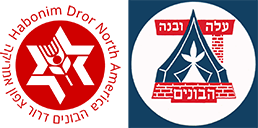BUILDING PROGRESSIVE ZI.ONIST ACTIVISTS
Exploring the Impact of Habonim Dror
A Study by Steven M. Cohen & Steven Fink, 2013
ABOUT US
Habonim Dror North America, the autonomous Labor Zionist youth movement of the US and Canada, has been around since 1935. Today it annually serves 2000+ idealistic Jewish youth ages 8-24 through its 7 summer camps, its Israel programs and its school year programming in 20 North American hub cities and 15 college campuses. Its activities mirror the Jewish & Zionist educational activities of Habonim Dror in 19 countries across the world and of HaNoar HaOved v'HaLomed its sister youth movement in Israel.
Machanot (Summer Camps) are in blue; Kenim & Eizorim (Year-Round Programming) are in red.
HISTORY | PHILOSOPHY & PROGRAM | |
Habonim Dror From 1935 till TodayFounded in 1935, Habonim Dror in North America – with its network of summer camps, local programming and Israel-based activities -- has directly touched on the order of 40,000 Jewish young people. Anecdotal evidence points to significant number of “Habos” (the insider term for Habonim Dror alumni) who have made aliyah, assumed lay and professional leadership positions in Jewish life, and become active in socially progressive organizations – all consistent with the articulated educational objectives of this progressive Zionist youth movement, the largest such movement in North America. While a small literature, almost all by alumni (or “bogrim,” the Hebrew term we use below), has provided historic context and impressionistic (and impressive) testimony to the impact of Habonim Dror, to date no social scientific survey has sought to understand the scope, depth and extent of its impact. This study, relying upon the responses of almost 2,000 Habonim Dror alumni, ages 18-83, represents a first attempt to assess the impact, and across a range of parameters. Such an enterprise will be of interest not only to passionate supporters of Habonim Dror, but also to all those with an interest in the impact of youth movements, Israel education and overnight Jewish summer camps. Indeed, this study comes at a moment in American Jewish history when interest in the study of “what works” in terms of Jewish education and commitment-building is especially critical, and when a mounting literature addresses such questions to a particularly attentive audience of policy makers, practitioners, and parents. In fact, the reasons for their attentiveness, and the context that has given rise to it, are important preliminary issues for the study of Habonim Dror, or any such Jewish educational endeavor in early 21st century North America. | A Progressive Zionist Youth MovementHabonim Dror sees its mission as twofold (from its website
“Habonim Dror runs 7 Machanot (summer camps) across Canada and the United States, an Israel summer program (MBI), a year-long Israel program (Workshop), and year round activities in many areas of the country (called Eizorim/Kenim) based on the pillars ofProgressive Labor Zionism, Judaism, Socialism, Social Justice, andHagshama (actualization of value)". Habonim Dror’s educational aspirations may be encompassed in the following domains:
According to the website, Habonim's brand of Labor Zionism continues to be relevant and to resonate with Jewish youth throughout the country. To examine these and related issues, Habonim Dror requested this study of its alumni, those who have had any contact with Habonim Dror. [1] In 1982 Habonim merged with Dror and Habonim Dror North America was created. |
To find out more about Habonim Dror Machanot Kayitz (Summer Camps), follow the links below to their website:
| Machaneh Miriam | Pacific Northwest (US and Canada) |
| Machaneh Gilboa | Western United States |
| Machaneh Tavor | Mid-West United States |
| Machaneh Gesher | Eastern Canada |
| Machaneh Galil | Pennsylvania and New Jersey |
| Machaneh Moshava (Mosh) | Maryland, Delaware, and Virginia |
